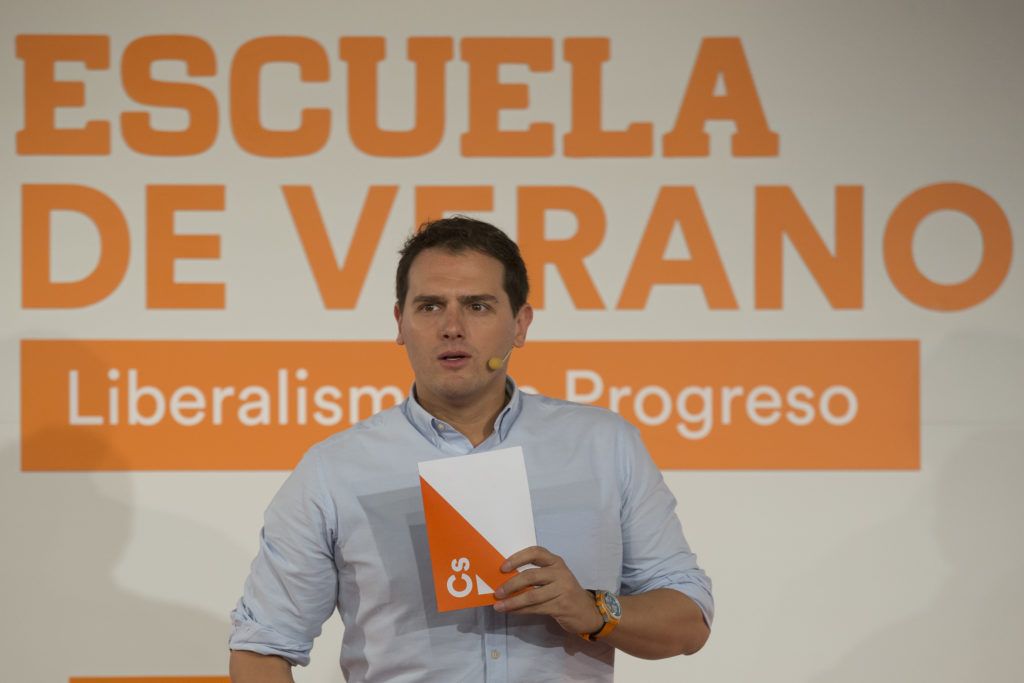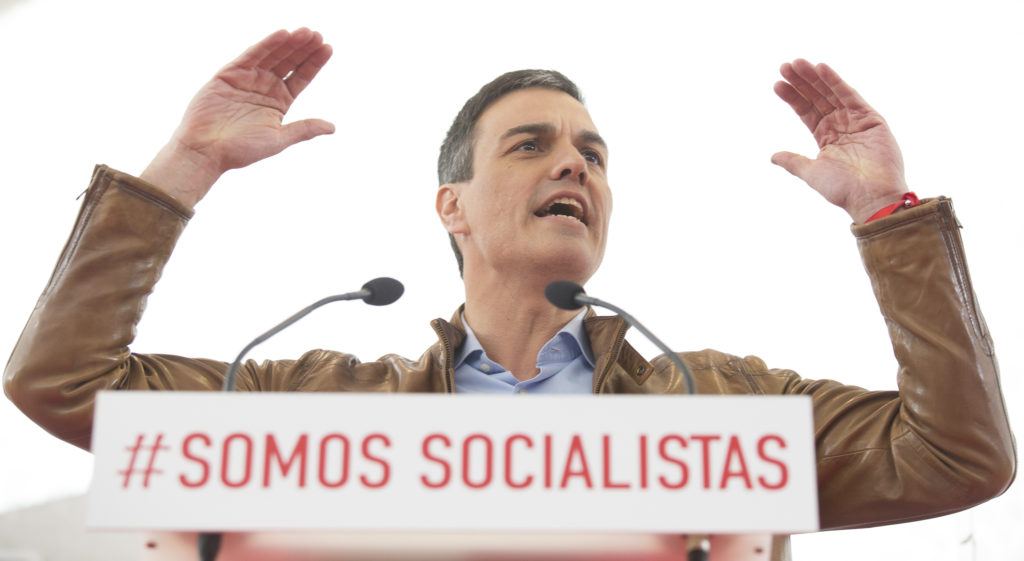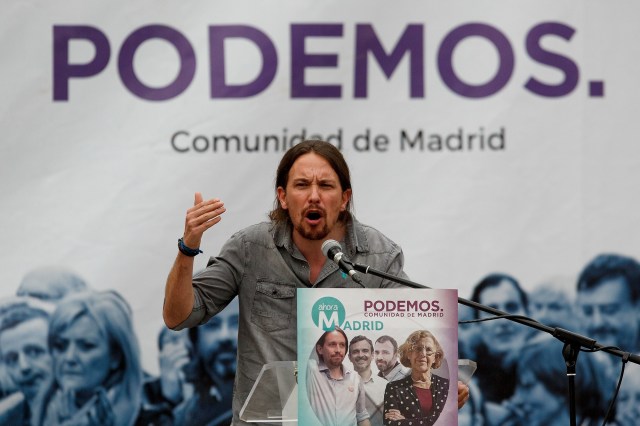(Photo by Pablo Blazquez Dominguez/Getty Images)

This is the first of a three-part examination of the movement causing waves within and beyond Spain – the Podemos political party led by Pablo Iglesias (pictured above). In tomorrow’s second piece James Bloodworth will review the party’s organisational origins, its policies and its electoral ups and downs. On Saturday he’ll focus on Podemos’ response to the secessionist movement in Catalonia.
***
You can learn a great deal in Spain, as elsewhere, by paying close attention to the names that adorn public buildings. Since 2014, travellers flying into Madrid have landed at the slightly shabby ‘Adolfo Suárez Madrid-Barajas Airport’. Suarez was Spain’s first post-Franco democratically elected Prime Minister; his name was added upon his death three years ago.
Adolfo Suárez’s political life embodied contradiction. A conservative Catholic and former Franco-era minister, during the democratic transition he nonetheless legalised the trade unions as well as the Spanish Communist Party (PCE). been impressed by the solemnity and discipline shown by the Communists at a 100,000-strong funeral for five people (including four of the party’s labour lawyers) who were shot dead by right-wing terrorists on Atocha Street in 1977, Suárez decided that it was time to legalise the PCE. They were, he concluded, self-contained enough to be a legitimate political force in the new Spain.
In the process Suárez took the unprecedented step of confronting the country’s powerful military establishment. Thus the Franco regime suffered a fate not dissimilar to that of several Eastern European post-war dictatorships: its final death warrant was signed by a middling bureaucrat spat out by its own nomenklatura.
Walking towards the Anton Martin district from south Madrid’s Atocha railway station, itself the scene of another massacre in 2004 as Islamist extremists planted bombs on packed commuter trains, any newly arrived visitor to Madrid soon encounters a haunting monument to those murdered during the ‘77 Atocha killings. In the cool and shady Anton Martin Square stand several inward-facing concrete human forms, perched atop a concrete plinth and locked in permanent embrace.
Basque terrorism and the central government’s forceful repression of the Catalonian independence referendum are more recent reminders that political disputes are not always peacefully resolved in Spain.
I followed the route past the square for a pre-arranged rendezvous with Jorge Moruno, one of the co-founders of Podemos in 2014 along with Pablo Iglesias and Miguel Urbán. He eventually arrived while I waited at the top of the steps to the Anton Martin metro station, a rare point of refuge from the sweltering midday sun.
Moruno is 34-years old, a sociology academic and the author of several books on the precarity of contemporary work. His explanation of Podemos’ appeal is both analytical and penetrating. Talking with him, one grasps that the secret of this “party of the left” is that it doesn’t always position itself on the left at all. Moruno explains, as I order a Café con leche in a nearby cafe:
“Nowadays we are supposed to be out of the crisis: Europe says, the Spanish government says, but seven of 10 families in Spain don’t see anything good…why? Because only the super-rich are seeing growth…inequality and poverty are still the same as two years ago.”
One of the words you hear a lot in Podemos is ‘hegemonía’ (hegemony), the concept of invisible power. This is an understanding of ideology as a material force in its own right, and lends itself to a political strategy based on forging a new window of acceptable wisdom through what the Italian Marxist Antonio Gramsci called a ‘war of position’.

The best recent example of a successful ‘war of position’ comes from the right. Asked what her greatest achievement was at a dinner for the Conservative MP Conor Burns, former British Prime Minister Margaret Thatcher famously replied: “Tony Blair and New Labour. We forced our opponents to change their minds”[1. Report on ConservativeHome from 2008.]. The goings on at provincial Tory party dinners are not usually the talk of Spain’s tapas bars and cantinas, but this remark was quoted back to me by leftists on several occasions during my time in Spain, and usually with a twinge of admiration. Mrs Thatcher’s conquest of her social democratic opponents – and their subsequent capitulation to the new common sense – was replicated to some extent in every western democracy in the 1980s, so that even her opponents came to accept the central tenets of her programme.
This is what Moruno calls the “discourse battleground”, and it is impossible to understand the rise of Podemos without first understanding both the degree to which social democracy suffered an internal collapse at the end of the twentieth century, but also the attempt by Podemos to forge a new hegemony in Spain.
“Margaret Thatcher…won one fundamental thing and this is why we talk about common sense…Because she was really a populist. If you listen to Margaret Thatcher, she didn’t talk to the rich people, she talked about the return of power to the people. A popular capitalism…I don’t like this way of thinking, but she won the battle of the 70s and 80s, the class struggle of the 70s and 80s.”
Following the restoration of democracy in Spain, the PSOE pursued an ideological trajectory similar to that of centre-left parties across Europe and the United States. As the left attempted to account for the crimes of Stalinism in the east and the challenges posed by the spread of Reagan-Thatcher economics in the west, mainstream social democratic parties began to gravitate rightwards – and in the eyes of many on the left away from the people they were elected to represent.
But then came the crash of ten years ago.
The 2008 crash posed big questions for Blairism, Clintonism and other social democrats
The ‘third-way’ hubris of the nineties and noughties was buried under $600 billion of Lehman Brothers debt, the territory that politicians such as Tony Blair, Bill Clinton and José Luis Rodríguez Zapatero had surrendered came back into play.
“This political space [has appeared], why?” Moruno asks me rhetorically…
“Because 30 years ago until now, they [social democrats] are making the same politics, the economic politics, as the conservative parties.”

When those politics produced the 2008 crash, these parties were seen as a cause of rather than the solution to the crisis.
The Podemos ‘hypothesis’ is built on three main tenets: the post-Gramscian idea of hegemony; the creation of a radical participatory democracy; and the ‘populist situation’ window of opportunity.
With respect to the latter of these, Podemos moved deftly, once the enthusiasm of the indignados had begun to wane, to channel the street protests into an effective electoral project. Adolpho Suarez had outfoxed the aging gargoyles of the Francoist establishment through sheer speed of action. Before they realised quite what he was up to, their power had been pulled from underneath them like the cloth whipped off a dining table. Podemos has gained ground in Spain through a similar seizing of the initiative.
Part of the reason this ‘window of opportunity’ has been seized by a party of the left rather than, as in most of Europe, by the nationalistic right lies in Spain’s failure to account for its past. Spain is the second country after Cambodia in terms of the documented cases of disappeared victims of political repression. In 1977, two years after the dictator’s death, an amnesty law was passed which granted most of Franco’s henchmen the right to die peacefully in their beds. Thirty years later the Socialist government of José Luis Rodríguez Zapatero did pass the Historical Memory Law, which granted state aid to help locate and exhume some of the more than 100,000 missing persons from the post-war period. But the ruling Popular Party (PP) has since stated that it will grant “not one public euro for the exhumation of mass graves”. Financial support was withdrawn soon after Mariano Rajoy’s electoral victory in late 2011.
There has in other words been little of what has come to be known euphemistically as ‘de-Baathification’ in Spain. The Popular Party was founded by Manuel Fraga, one of Franco’s former ministers. In the early years it contained many former Francoists in its ranks. Nowadays the PP is in most respects a conventional European centre-right party. Yet its antecedents in Francoism – the sickly blend of authoritarianism, right-wing Catholicism and ‘family values’ which dominated the country for nearly half a century – has allowed it to retain an electoral hold over the contemporary far-right. There has been no comparable David Cameron figure in Spain who has felt secure enough to dismiss those on his right flank as “fruitcakes, loonies and closet racists”. And so it has been estimated that over 80% of people who describe themselves as far-right voted for Mariano Rajoy in the two most recent national elections.
Unapologetic admiration for the Generalissimo is, for the most part, a niche affair in Spain. A handful of extremists still gather every year at the Valle de los Caídos, a huge basilica just outside Madrid, to commemorate Franco’s death and sing the Cara al Sol with an arm flung skyward in a Roman salute (or to most of us, a Nazi salute). But most people just get on with the act of getting on – forgetting the 1936-39 civil war and subsequent dictatorship was officially enshrined in Spain’s transition to democracy forty years ago.
There have been a few frustrated attempts to revive a distinctive right-wing populism in recent times. The most high profile of these was Vox, a right-wing Catholic party founded in December 2013 by disgruntled elements within the Popular Party. Vox pledged to criminalise abortion, crackdown on migrants and create a more centralised state. Yet despite the relative success of similar parties across Europe’s more northerly regions, the party failed to win any seats at the 2014 European elections.

Ciudadanos (‘Citizens’) is arguably another ‘populist’ party that has emerged in Spain in recent years. It is intensely hostile to Catalonian independence and has in the past proposed that undocumented migrants be stripped on the right to healthcare in Spain. Founded in 2006 by former Popular Party member Albert Riveras, after nearly a decade in Catalan politics Ciudadanos announced that it would field candidates at the 2015 national election. The party rose up the polls rapidly at first, winning 40 seats; yet it was leapfrogged at the same election by Podemos, who finished third. The result was replicated in 2016, when Cuidanos lost eight of the seats it had won barely six months earlier.
The most electrifying insurgent response to the 2008 financial crisis has undoubtedly come from Podemos. The party’s ‘economic plan for the people’, released in 2014, called for a higher minimum wage, a 35-hour week and the restructuring of the country’s national debt.[i] It also included plans to nationalise Spain’s utilities – though notably this was left out of Podemos’ 2015 election manifesto.
The hegemonía of the wider political order has already started to shift. The PSOE recently re-elected Pedro Sanchez, a politician of the left who, like Jeremy Corbyn in Britain, enjoys the support of grassroots party members and provokes the reflexive hostility of party grandees.
“So we talk about these things, and now the socialist party is talking about them,” says Moruno. “So the real hegemony is when your words are the words that your adversaries use…So hegemony is to…[bring] the others to come to your side and talk about the topics you want to talk about.”
This evidently works best with opponents you are in close proximity to. The real work – of bringing about a transformation of wider society – begins when you have power, and when your opponents are scrambling around desperately trying to adapt to the new consensus.

Podemos is especially influenced by the post-Gramscian ideas of the late Argentinian professor Ernesto Laclau and the Belgian political theorist Chantal Mouffe. Their theory of populism posits that political movements draw their strength from the groups that stand in opposition to them. “Every identity is dislocated insofar as it depends on an outside which both denies that identity and provides its condition of possibility at the same time,” as Professor Laclau[1. Laclau: A Critical Reader, Simon Critchly, Oliver Marchart, 2012.] phrases it.
And so rather than abandon the territory of ‘in’ and ‘out’ groups to right-wing populism, Podemos has introduced dichotomies more to its own liking:
The people versus the oligarchy;
The ‘99%’ versus ‘the 1%’;
The top versus the bottom.
In other words, in order to slay the dragon you have to become a dragon yourself.
Witnessing first-hand the rise of obscurantism and xenophobia in 1930s Europe, Victor Serge, in his Memoirs of a Revolutionary, warned that it was:
“The failures of the others that makes for the strength of the Führers. When there’s no worthwhile banner, you start to march behind worthless ones”.
The rise of the likes of Marine Le Pen and Viktor Orbán on the back of widespread working class support is, on this analysis, an indictment of the left.
Adriá Porta Caballé, an academic who previously worked for the party’s deputy leader, Íñigo Errejón, made a similar point when I met him in Barcelona a few days after my chat with Moruno:
“Wherever populism is hegemonised by reactionary forces, it is a symptom that the left has been defeated there, because it’s not doing the battle at the same level.”
During the Brexit referendum campaign back in Britain, the prominent Leave campaigner Michael Gove was widely ridiculed for saying that Britons had “had enough of experts”. But Britain’s current environment secretary was onto something. There is dwindling faith in the idea of managerial politics, as it is pursued by professional technicians and often devoid of conflict. Porta Caballé told me over a glass of beer at the Baccardi Cafe on Barcelona’s Paseo de Sant Joan that he believes this way of doing politics is “dead”:
“This social democratic third way dream that we could have a democracy that would be purely rational and deliberistic without antagonism, I think it’s dead… If you want to fight fascism and racism, it is not enough to say ‘oh this is irrational, this is not right, if you look at the statistics this is not gonna happen’. Because fascism and racism are presenting…a very strong conflict, and if you want to displace that you have to present another one. Which can be much more positive… But you have to confront them on the basis of passions.”
When Podemos first appeared on the scene, the party’s apathetic approach toward traditional categories and shibboleths predictably angered some within the old guard of the Spanish left, as all breaks with established doctrine invariably do.
“Podemos was born talking about how the problem is not [whether] you call yourself left or more right…The problem is bottom up,” Moruno tells me back in Madrid.
“And this broke the political framework because if you proclaim ‘I am more left than the socialists’, you will always be the little child of the Socialist Party. And we said no, we have to kick the table [away], and we have to change the positions. The problem is not [whether] you are left or right, the problem is democracy against oligarchy.”
Moruno is fairly unrelenting in his criticism of established communist parties – both in Spain and elsewhere – despite the fact that Pablo Iglesias’ faction of the party appears to have effectively formed a loose alliance with the PCE. Moruno sees a breach with the old left as inevitable.
“The Stalinist party, if in the general elections they have less votes than the last time, they think that this is better, that they are making progress because this means that the bourgeoisie are working against them. So it’s more than that you can’t talk to the people; it’s a symbol you are doing well! So this is the worst legacy of the Soviet Union: the political culture of the communist parties…I think in the entire twentieth century, the communist parties used to take the conservative position at every important historical point.”
At the 2016 election Podemos promised to make the country ‘smile’ again. Yet the party surprised many of its supporters by leaving the introduction of a Basic Income – an all-the-rage economic idea whereby every citizen would receive a flat amount of money every month whether in work or not – out of its manifesto.
Moruno is adamant, however, that the future of left-wing politics – the “spirit of communism”, as he calls it – should be rooted in a shift away from the fetishisation of labour and toward a future in which, to paraphrase Karl Marx’s famous remark, the citizen would be free to ‘hunt in the morning, fish in the afternoon, criticise in the evening…without ever becoming hunter, fisherman or critic’. Moruno:
“We have the possibility for the first time to make another kind of society where the working contract, or the salary they pay you, [isn’t] the central point of our biographies. When we talk about class, [the] working class, what does it mean today? Because there are a lot of kinds of working…We can [also] value activities that don’t receive pay. Because in the capitalist society it’s considered that it’s only a [proper] activity if they pay you for it. And you can only receive an income if you have this kind of work. We have to explode this logic. We have to value social activities that don’t receive money, and we have to make another kind of income independent of work.”
Too often in recent times the left has retreated to a purely critical and theoretical bearing. It has lived “in the midst of ideas about people, instead of among the people themselves”, as Czeslaw Milosz wrote in his humanist critique of Polish Stalinism. The danger inherent in the alliance Podemos forged with the traditional left at the 2016 election is that, to paraphrase Marx, all the old crap might revive. The old divisions of the past could creep back in, inducing sclerosis in the young patient.
Yet the idea that Podemos could remain forever equidistant from the old divisions – that the party could be viewed in perpetuity as non-ideological or ‘beyond left or right’ – was perhaps far-fetched to begin with. If you believe that politics is fundamentally about a clash of interests, then it is possible that those interests roughly correlate to the divisions of the past, even today.
The question, then, is how to forge a new left on the bones of the old – and how to do so without being dragged under by the various historical re-enactment societies with their desire to repeat the twentieth century all over again.
Moruno is interested in winning the smaller political battles of the present; but he keeps coming back to the importance of thrashing out a captivating vision of the future.
“It’s not enough to talk about how bad things are, we need to project another kind of future [that is] different than the way we live nowadays,” Moruno says before we exchange fraternal goodbyes and I head back towards Atocha Station to catch my train to Barcelona.

Earlier on, as we had sat down in the coffee shop, Moruno noticed me brandishing – tourist-like – a book on the Civil War. Moruno believes that one of the problems with the contemporary left is its obsession with defensively re-fighting the battles of the past.
“If you don’t hold up a vision of the future, you become conservative…This is a big problem of all the European societies because we don’t have another utopia…A lot of years ago there was socialism or barbarism. Now we only have the barbarism. So the problem is we need also a new horizon, a new utopia…to [show] it is possible that we can live better.”
All successful populist movements draw their lifeforce from the absolute certainty that those in power no longer care about their people. Therefore to renew the country, the people (as defined by the populists) must cast off these parasites like a dog shaking off its fleas.
Podemos has retained this ‘in’ and ‘out’ dichotomy – while redefining it on its own terms. Meanwhile it has eschewed the usual lug-rotting leftist jargon that inspires such a state of resentful boredom in most remotely normal human beings.
For this alone Podemos should command a degree of respect; and it is why I suspect they will be a fixture on the Spanish scene for the foreseeable future.
Please call by tomorrow for part two of this three-part profile of Podemos.










Join the discussion
Join like minded readers that support our journalism by becoming a paid subscriber
To join the discussion in the comments, become a paid subscriber.
Join like minded readers that support our journalism, read unlimited articles and enjoy other subscriber-only benefits.
Subscribe